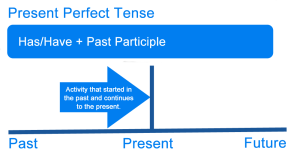Nghiên cứu tình huống ví dụ
Duc: Have you travelled a lot, Mai?
Mai: Yes, I’ve been to lost of places.
Duc: Really? Have you ever been to China?
Mai: Yes, I’ve been to China twice.
Duc: What about Thailand?
Mai: No, I haven’t been to Thailand.

khi chúng ta nói về một khoảng thời gian kéo dài từ quá khứ đến hiện tại, chúng ta sử dụng thì hiện tại hoàn thành (have been / have travelling v.v.). Ở đây, Mai và Duc đang nói về những nơi Mai đã đến trong cuộc đời cô ấy, đó là một khoảng thời gian kéo dài cho đến hiện tại.
Một số ví dụ về trường hợp này:
- Have you ever eaten caviar?
- We’ve never had a car.
- ‘Have you read Hamlet?’ ‘No, I haven’t read any of Shakespeare’s plays.’
- Susan really loves that film. She’s seen it eight times!
- What a boring film! It’s the most boring film I’ve ever seen.
Been (to) = visted:
- I’ve never been to China. Have you been there?
Trong các ví dụ sau đây, người nói đang nói về một khoảng thời gian vẫn tiếp tục cho đến hiện tại:(recently / in the last few days / so far / since breakfast etc.)
- Have you heard anything from Barian recently?
- I’ve met a lot of people in the last few days.
- Everything is going well. We haven’t had any problems so far.
- I’m hungry. I haven’t eaten anything since breakfast. (= from breakfast until now)
- It’s good to see you again. We haven’t seen each other for a long time.
Tương tự như vậy, chúng ta sử dụng thì hiện tại hoàn thành với today / this evening / this year etc. khi những khoảng thời gian này chưa kết thúc tại thời điểm nói.
- I’ve drunk four cups of coffee today.
- Have you had a holiday this year?
- I haven’t seen Duc this morning. Have you?
- Rob hasn’t worked very hard this term.